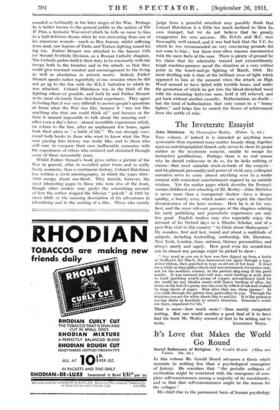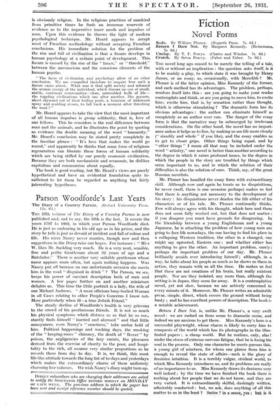It's Love that Makes the World Go Round
IN this volume Mr. Gerald Heard advances a thesis which amounts to nothing less than a psychological conception of history. He considers that " the periodic collapses of civilization might be correlated with the emergence of com- plete self-consciousness among a majority of its constituents, and so that that self-consciousness might be the reason for the collapse."
His chief clue to the permanent basis of human psychology is obviously religion. In the religious practices of mankind from primitive times he finds an immense reservoir of evidence as to the imperative inner needs and impulses of man. Upon this evidence he throws the light of modern psychological technique. Mr. Heard appears to accept most of Freudian methodology without accepting Freudian conclusions. His immediate solution for the problem of the rise and fall of civilization is that a fissure develops in human psychology at a certain point of development. This fissure is caused by the rise of the " limen," or " threshold," between the unconscious and the conscious elements of the human psyche.
" The facts of civilization and psychology allow of no other conclusion. We are compelled therefore to enquire how such a fissure came. about. What was it that split society and released the atomic energy of the individual, which throws up out of small, stable, continent communities—clear, untroubled wells of life— the toppling civilizations which one after another, like geysers, shoot skyward out of their boiling pools, a fountain of iridescent spray and scalding steam, to fall back a moment after threshing the mud ? "
Mr. Heard appears to take the view that the most important of all human impulses is group solidarity, that is, love of our fellows. This he considers is the real difference between man and the animals, and he illustrates the point by quoting as evidence the double meaning of the word " humanity." Mr. Heard's conclusion may be stated pretty completely in the familiar phrase : " It's love that makes the world go round," and apparently he thinks that some form of religious regeneration can liberate these forces of human solidarity which are being stifled by our purely economic civilization. Because they are both mechanistic and economic, he dislikes capitalism and communism about equally.
The book is good reading, but Mr. Heard's views are purely hypothetical and have an evidential foundation quite in- sufficient to let them be regarded as anything but fairly interesting hypotheses.



































 Previous page
Previous page